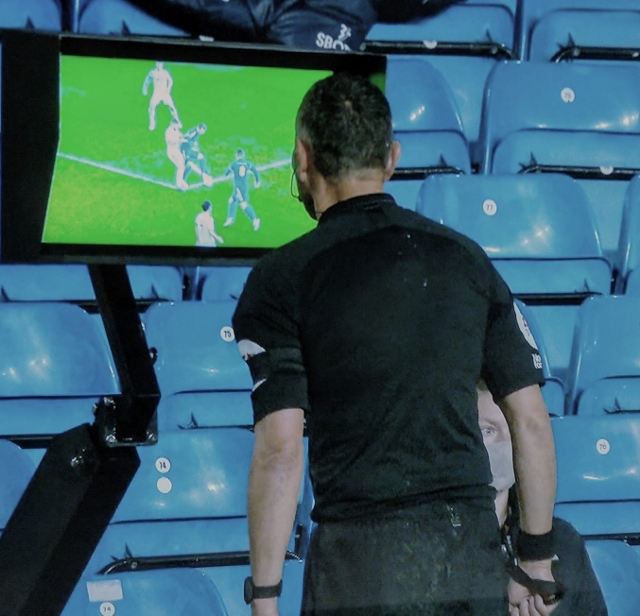To paraphrase the song, ‘How do you solve a problem like VAR?’ Is the use of technology changing the way the game is played, viewed or refereed? Will crowds have to come to terms with some delays as goals, penalties or reds cards are confirmed? Is the competence of on-field officials being undermined? Can the match-going supporter have any say on how the use of technology can be determined for the future?

As only a small proportion of supporters have managed to watch matches from the stands in the last twelve months, it is difficult to give an up-to-date view on how VAR decisions are affecting the atmosphere or enjoyment of the game. However, as supporters have been confined to watching matches via screens at home, the controversies surrounding VAR appear to be growing, with fans voicing more and more concern.
Some of the issues have little to do with the VAR system and are more attuned to the rules of the game, as deigned by IFAB, governing marginal objective decisions, such as, offside. Other issues are more to do with the interpretation of these rules, overseen by FIFA, particularly in relation to subjective decisions, such as, handball.
Views on VAR are wide ranging. On one extreme, there are those who want to see VAR abandoned – often citing it is better for the ethos and flow of football to resort to the on-field officials’ decisions, realising errors will be made and fans should just accept this. On the other extreme, there are proponents calling for more use of technology, as it is proven to be helping officials get more decisions correct – accuracy being important in game with tight margins.
With broadcasters able to show, perhaps more definitively, where correct or incorrect decisions are being made, the introduction of technology was (and for the present remains) inevitable. However, are we seeking perfection in an imperfect world – at least on a football pitch, where some decisions will always be subjective no matter how many times you review them on a monitor. Few have argued against the benefit of goal line technology – although, would England still have gone on to win the World Cup in ’66 if it had been available then?
With supporters’ groups calling for some form of dialogue on the continued use of VAR, at its AGM in December, the Football Supporters’ Association (FSA) voted in a motion, the aim of which is too formulate an official position on the use of VAR – with specific reference to match-going fans.
To this end, the FSA have already formed a VAR working group to research and come up with suggestions for the National Council, so that they can form policy and action that fans’ groups could adopt. This will involve surveying supporters, talking to the various football authorities, players’ unions and clubs. The Foxes Trust have already been communicating to other supporters’ groups and the Premier League the views expressed by its members in answers to its own survey back in 2020.
One of the first actions of the working group was to set-up a briefing meeting for the FSA Premier League Network with the Professional Game Match Officials Ltd (PGMOL), the body responsible for appointing and training match and VAR officials. At the briefing the head of PGMOL, Mike Riley, along with colleagues, addressed common questions that fans raised regarding the use of VAR.
This meeting was a useful addition to the demonstrations arranged at VAR HQ Stockley Park, back in the summer of 2019 (reported on at the time on the FT website). Whilst some concerns continue to be unanswered and opposing positions remain entrenched, it was clear that fans’ views are important to PGMOL. This point was further emphasised at the Premier League Supporter Engagement meeting in March, when it is was agreed that direct consultation between PGMOL and FSA was desirable and that more information regarding how VAR decisions are arrived at, should be made available to fans.
A report on the meeting with PGMOL can be found at:
https://thefsa.org.uk/news/a-constant-conversation-officials-meet-fans-to-talk-about-vars-impact/
FT Board member, Steve Moulds, is one of three FSA Premier League Network representatives to the National Council and is a member of the VAR Working Group.